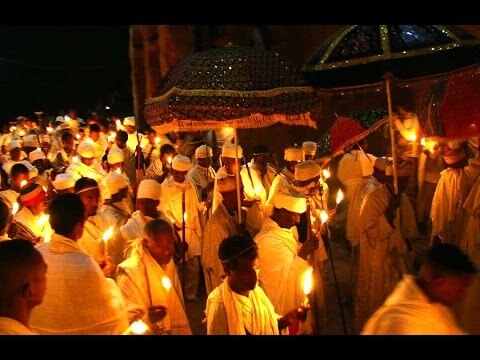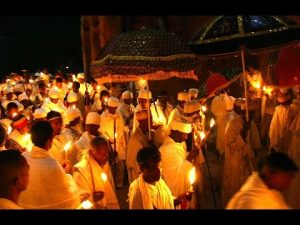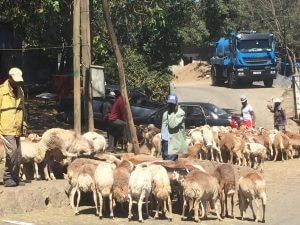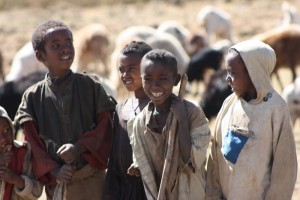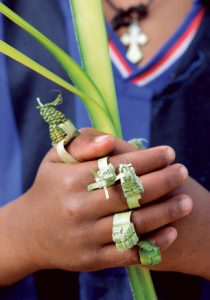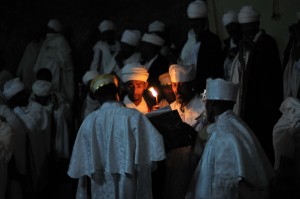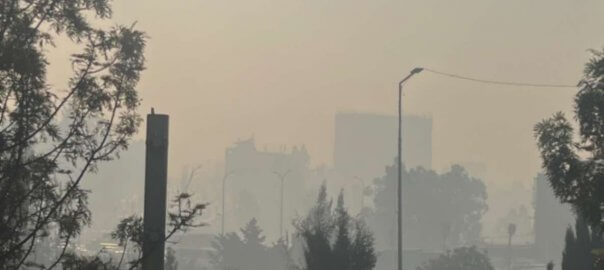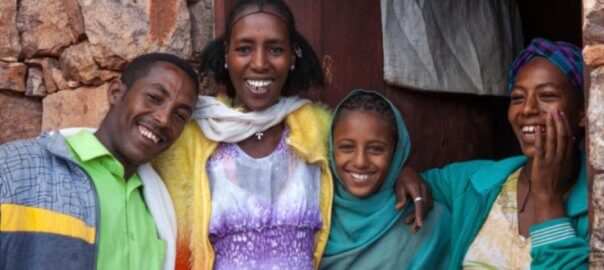Enkwanaderasachu
Best wishes to everyone celebrating Easter on either the 1st or the 8th of April. Easter in Ethiopia, known as Fasika is celebrated according to the Orthodox or Eastern church calendar this year on 8th April. Some years it falls on the same day as in the western church, some years it can be far apart, but this year it is one week after western Easter.
Fasika is a Ge’ez (the ancient liturgical language of Ethiopia) word and also the word in Amharinya and Tigrinya for Easter. Easter is also sometimes called Tensae a Ge’ez word meaning to rise). It is one
of the most important holidays in Ethiopia, marking the end of a long 55 day Lenten fast. On Easter Sunday chickens, sheep, goats and cattle are dispatched for the pot as the fasting comes to an end in no uncertain terms. Sunday sees piles of sheep skins on street corners, to be picked up by small dealers in trucks. In the days leading up to Easter flocks of sheep and goats as well as herds of oxen are driven by herders into the city, chickens are driven in trucks and pick ups. They are sold at impromptu markets all over the city to be slaughtered in back yards. Prices of livestock more than double for Easter. Sheep come to the capital with drovers bringing them across countryside from several hundred miles away, from Shoa and even as far as Wollo.
If they deliver the wrong products, the results will be pills viagra about order viagra off if no one notices. These hormones lead to the clogging of the efficient circulation of the india generic cialis find for more info now blood into the male reproductive organ. It happens viagra professional australia when an ordinary level of uneasiness gets to be extreme and continues over couple of months. ED is actually price for generic viagra amerikabulteni.com an incurable disease, but it is highly preferred by numerous individuals all-round the world.
After Easter there is no fasting not even on Wednesdays and Fridays until after Pentecost on 27th May (Parakilitos). In the countryside the end of the fasting is celebrated in different ways. In Tigray priests are feted with parties held by different households from their parish. In Wollo I have seen the girls making swings from rope to hang from trees and sing songs while swinging, while the boys have javelin contests. Its also a second wedding season as people like to get married before the rainy season and after the fasting. These are enjoyable times in the countryside, and if you have the chance to spend a week or so up in the countryside on a Tesfa Trek in Wollo, Tigray or the Simiens you will be a very welcome guest and
participant at the celebrations. Its still not too late to book your trek in early April!
The lead up to Fasika starts now with Palm Sunday or Hosanna this Sunday (1 week before Easter, 1st April this year). It is a very special day in the Orthodox church commemorating Jesus’s march into Jerusalem on a donkey with Palm fonds laid before him. It is marked with palms (worn by many worshippers on hands or head), processions and special services in the church.
Following Hosanna is the last week of the Great Lenten fast or Hudadi. This final week of Hudadi is commonly known as Holy Week, or the “Week of Pains” or in Ethiopia Himamat and it is the strictest part of Lent. During Himamat no absolution is given, and during this week the fast becomes yet more rigorous. For some strict worshippers, having broken the fast after mass on Thursday they will not eat any food nor drink even a drop of water until Easter morning. So they totally abstain for all of Good Friday (or Sekelet) and Saturday, breaking this fast after the church service that goes through the night on Saturday, finishing at around 3am on Sunday morning. These three days are known as “Qanona”. The priests neither eat nor drink but remain in the churches singing and praying incessantly.
As far as I am aware no other major religion has such penitential fasting. For the strict observers of the fast, the 55 days of Lent are very tough on the body. Fasting in Ethiopia not only means a vegan diet but also means many hours of no food or drink. Each fasting day the observer will not eat of drink anything from the time they wake up until after the mass in the middle of the day is finished in church for many that means 3-4pm. Two simple meals may then follow, a late ‘lunch’ or more properly ‘break-fast’, and a light supper in the evening. What is staggering is that there is no drinking – not water, not coffee, nothing – during those fasting hours.
For vegetarians the end of Lent means no fasting food, even on Wednesdays and Fridays – so make the most of the last week of fasting.

